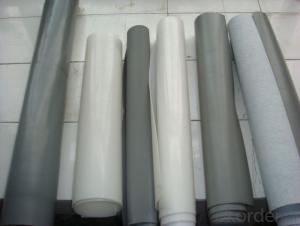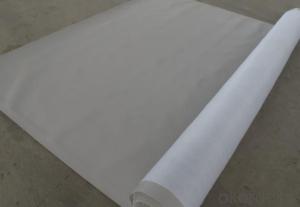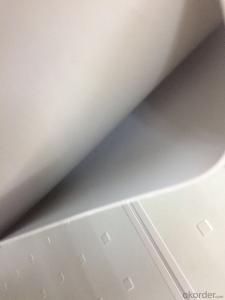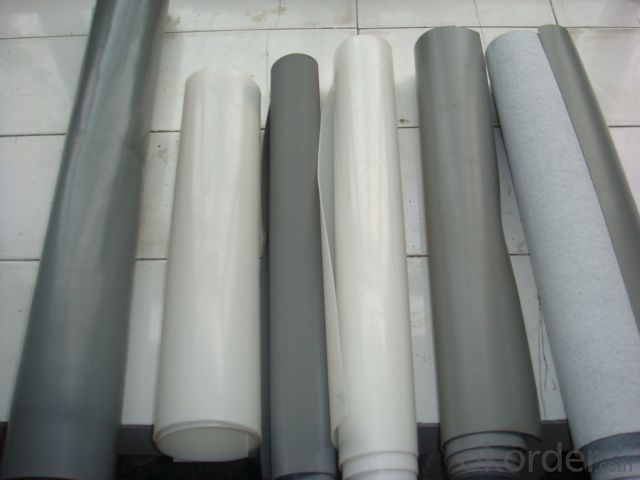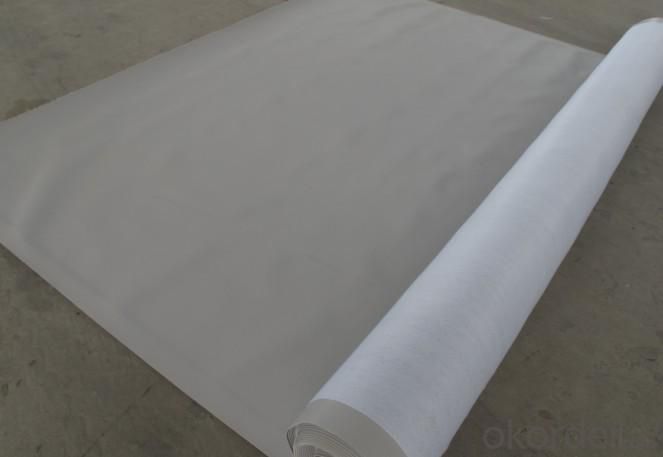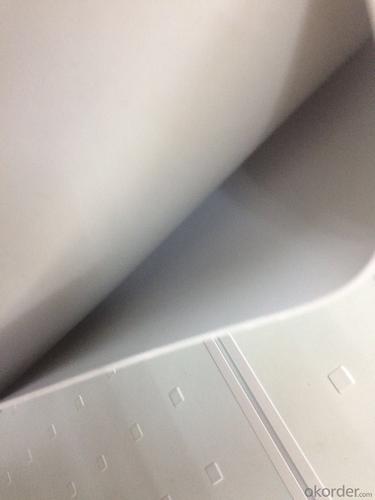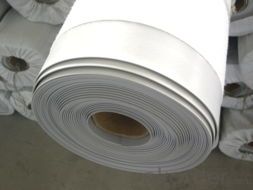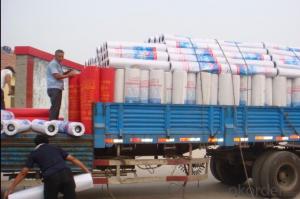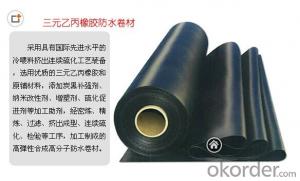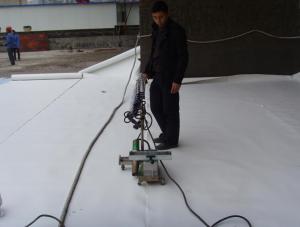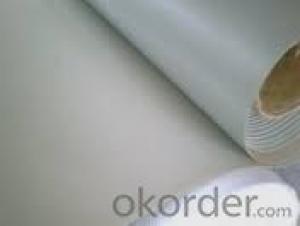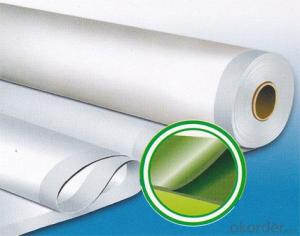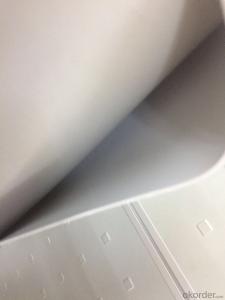PVC Waterproofing Membrane 1.5 mm from Manufactory
- Loading Port:
- Tianjin
- Payment Terms:
- TT OR LC
- Min Order Qty:
- 5000 m²
- Supply Capability:
- 100000 m²/month
OKorder Service Pledge
OKorder Financial Service
You Might Also Like
PVC waterproofing membrane
Polyvinyl Chloride (PVC) waterproof membrane is a new polymer waterproof membrane which is made from polyvinyl chloride resin, and mixed with plasticizer, filler, antioxygen, ultraviolet absorber and other auxiliaries.
Product Applications:
1. All kinds of roofs, such as steel structure roof, planted roof etc.
2. Underground engineering, such as basement, subways, tunnels, air raid shelter, etc.
3. Other projects like artificial lake, dam, water reservoir, grain storehouse, etc.
Product Features:
1. Excellent aging resistance.
2. Root resistant penetration, specially used on planting roof.
3. Welding installation. Joints are solid and environment friendly, no pollution.
4. High tensile strength, good elongation and dimensional stability.
5. Good plasticity, easy and suitable for details installation.
6. Fireproof. Fire extinguished out of the ignition resource.
Product Specifications:
1. Size: 2.05(width)*20m (length), as clients' request
2. Thickness: 1.2mm; 1.5mm; 2.0mm, etc
3. Type: Homogeneous, Reinforced, Fabric back
4. Exposed and Non-exposed
5. Color: white, Grey or customized
FAQ:
Q: Can I get samples?
A: Yes, we could arrange samples for free.
Q: Can I do the third party testing before loading?
A: Yes, we could accept the third party testing.
Q: Which kind of payment in your company?
A: We could accept TT, LC at sight, etc.
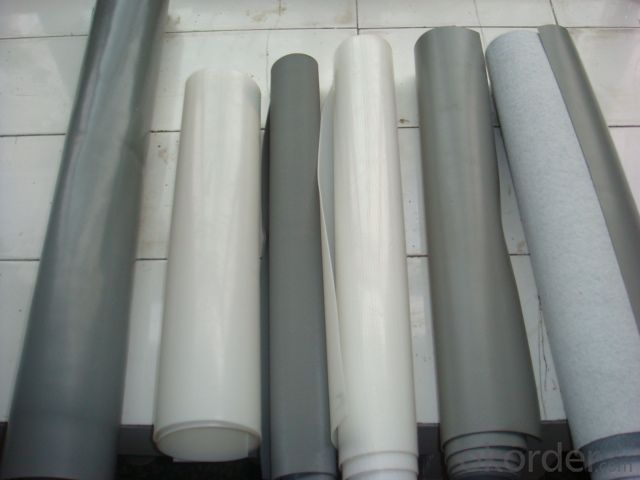
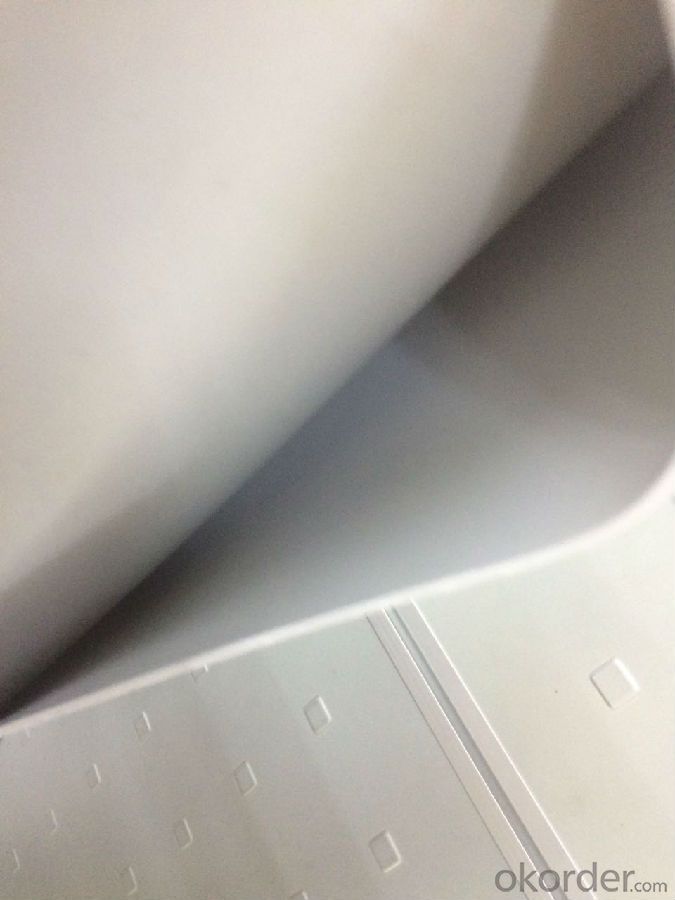
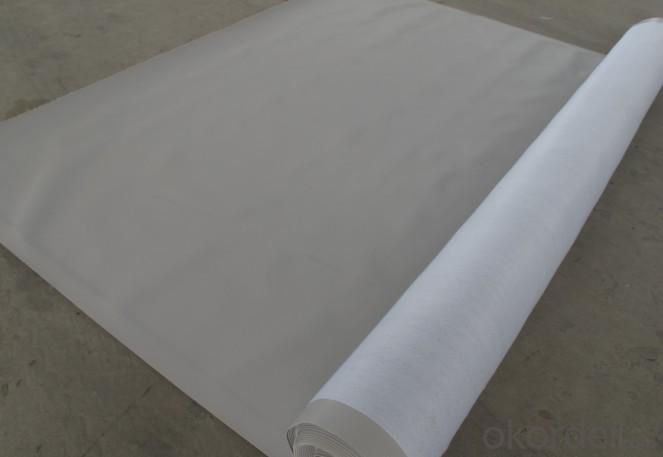
- Q: Are waterproofing membranes resistant to high-pressure water jets?
- Yes, waterproofing membranes are generally resistant to high-pressure water jets. These membranes are designed to provide a barrier against water penetration and are tested to withstand various water pressures. The level of resistance may vary depending on the specific type and quality of the membrane. However, in general, waterproofing membranes are engineered to withstand high-pressure water jets, ensuring effective protection against water infiltration and potential damage to the underlying structure.
- Q: Can a waterproofing membrane be used for HVAC systems?
- No, a waterproofing membrane is not suitable for HVAC systems as it is specifically designed to prevent water penetration and does not have the necessary properties to regulate air flow or temperature control required by HVAC systems.
- Q: It is good for black roof with waterproof paper
- No film or PE film (black surface) coil is generally not used for the roof; if the roof is often on the need to lay in the coil above the 5 cm thick cement mortar to do the protective layer or the choice of sand and shale surface waterproof Coil. Lough membrane (silver surface) The role of the membrane to play the radiation can be used directly for the roof without any protection.
- Q: What is the difference between SBS and APP rolls?
- Compared to the use of SBS waterproofing membrane to use a larger range. But each has its own advantages and disadvantages, according to the local environment and the actual situation of the building in combination with the characteristics of two kinds of coil to choose materials. You have to compare the next, I can only tell you SBS waterproofing membrane prices than APP waterproofing membrane high.
- Q: Are waterproofing membranes resistant to mineral oils?
- The resistance of waterproofing membranes to mineral oils can differ. Certain membranes are purposely engineered to withstand mineral oils, while others may not possess this capability. To ascertain the resistance level of a specific waterproofing membrane to mineral oils, it is crucial to review the manufacturer's specifications and product details. Moreover, seeking advice from a professional or directly contacting the manufacturer is advised to obtain tailored guidance regarding the compatibility of a waterproofing membrane with mineral oils in your unique scenario.
- Q: Can a waterproofing membrane be used on tunnels?
- Yes, a waterproofing membrane can be used on tunnels. Waterproofing membranes are commonly used in tunnel construction to prevent the ingress of water and protect the structure from potential water damage. These membranes are designed to be highly durable, flexible, and resistant to external factors such as water pressure and ground movements. They provide a reliable barrier against water infiltration, helping to maintain the structural integrity of the tunnel and ensure its long-term functionality.
- Q: Can a waterproofing membrane be used for outdoor applications?
- Outdoor applications can indeed benefit from the use of a waterproofing membrane. Their primary purpose is to shield against water and moisture infiltration, making them well-suited for outdoor settings where exposure to rain, snow, and other weather elements is a concern. These membranes find extensive use in various outdoor areas, including roofs, balconies, decks, and foundations, as they effectively protect against water damage and ensure long-term durability. They form a reliable barrier that keeps water out while still allowing the structure to breathe, preventing the accumulation of moisture and potential problems like mold and rot. Ultimately, utilizing a waterproofing membrane for outdoor applications is a wise decision that enhances the structure's longevity and performance.
- Q: Can a waterproofing membrane be used for plant rooms or mechanical spaces?
- Yes, a waterproofing membrane can be used for plant rooms or mechanical spaces. These areas often require protection against water damage due to the presence of pipes, equipment, or other mechanical systems. A waterproofing membrane provides an effective barrier to prevent water intrusion and protect the integrity of the space.
- Q: Is a waterproofing membrane resistant to mold and mildew growth?
- Yes, a waterproofing membrane is resistant to mold and mildew growth. This is because waterproofing membranes are specifically designed to create a barrier against moisture, preventing water from seeping through and causing mold and mildew to grow. By effectively sealing off the area, these membranes eliminate the conditions necessary for mold and mildew to thrive, such as dampness and moisture. However, it is important to note that while the membrane itself is resistant to mold and mildew growth, it does not guarantee complete protection against these issues. Proper installation, regular maintenance, and ensuring proper ventilation are also crucial in preventing mold and mildew growth in the long term.
- Q: Can a waterproofing membrane be used for dams?
- A waterproofing membrane is suitable for dams, which are constructions designed to retain water and form reservoirs. It is of utmost importance to guarantee that these structures are impenetrable to water to avoid leakage and potential harm. In the construction of dams, it is typical to utilize waterproofing membranes as a safeguard against water infiltration, which could lead to erosion or compromise the structural integrity. These membranes are typically composed of resilient materials like rubber or reinforced PVC, engineered to withstand water pressure and endure over time. Furthermore, the installation of a waterproofing membrane also aids in mitigating the potential risk of seepage and leakage in the dam, ensuring the overall structure's safety and efficacy.
Send your message to us
PVC Waterproofing Membrane 1.5 mm from Manufactory
- Loading Port:
- Tianjin
- Payment Terms:
- TT OR LC
- Min Order Qty:
- 5000 m²
- Supply Capability:
- 100000 m²/month
OKorder Service Pledge
OKorder Financial Service
Similar products
Hot products
Hot Searches
Related keywords
